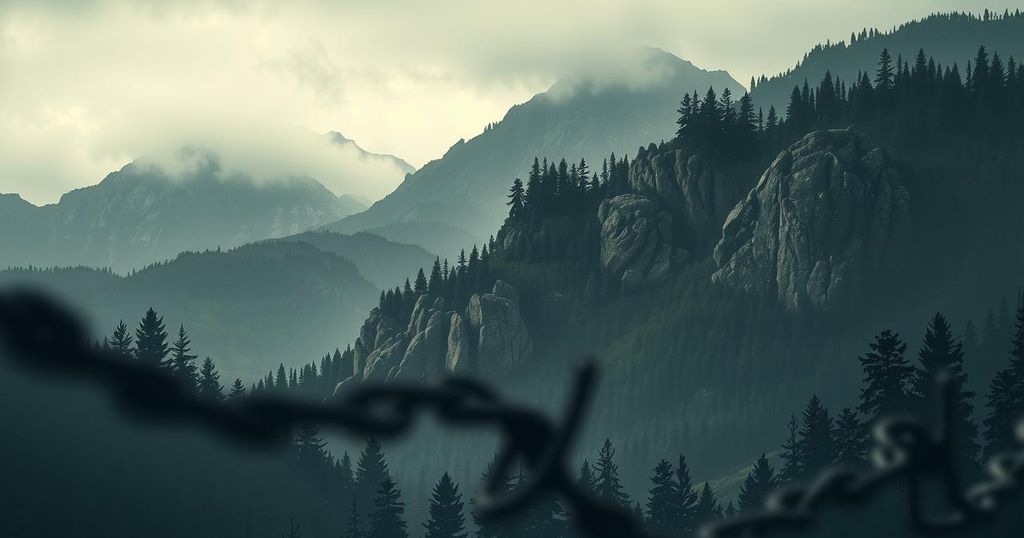Escalation of Conflict in DR Congo: The Role of M23 Rebels
The M23 rebels have intensified conflict in the DRC, particularly Goma, leading to numerous casualties and displacements. Founded in 2012 from ethnic tensions related to mineral wealth, M23 claims to defend Tutsis from Hutu militias while also seeking resource control. Allegations of Rwandan support complicate the situation, while the effectiveness of international peacekeeping forces is questioned. A summit is anticipated to address these escalating tensions.
The resurgence of the M23 rebels in the eastern Democratic Republic of the Congo (DRC) has intensified unrest, particularly in the city of Goma. With conflict stemming from ethnic tensions and valuable mineral resources, the situation has escalated significantly, resulting in the deaths of at least 13 international peacekeepers and displacing over 400,000 individuals this year, as reported by United Nations estimates. Local residents have expressed mixed feelings toward the rebels, characterized by both apprehension and cautious acceptance amidst fear of their unpredictable behavior.
The M23 group, comprised largely of former Congolese soldiers primarily of Tutsi ethnicity, emerged in 2012 as an offshoot of earlier forces and is named after a peace agreement from March 23, 2009. The group accuses the DRC government of failing to honor this agreement, thus justifying their armed opposition. Currently, M23 is one of nearly 100 armed factions competing for dominance in the mineral-rich eastern regions of the DRC.
M23 claims to defend marginalized Tutsis within the DRC against Hutu militias while simultaneously seeking control over the region’s abundant mineral resources, such as gold, copper, and coltan, which are vital for technology. The group’s activities are reportedly funded through taxation on mining operations in their controlled areas, aligning their military strategies with economic interests in the region.
The M23 rebels are engaged in conflict with the Congolese army and allied forces, which include a United Nations peacekeeping contingent. While this international force has been present since 1999, its effectiveness has been questioned, leading Congolese authorities to request its withdrawal by the end of 2024, although the mission’s duration was recently extended for another year.
Allegations of Rwandan support for the M23 rebels have emerged, with U.S., French, and British officials citing the presence of Rwandan troops within DRC territory. The DRC attributes its severed diplomatic ties with Rwanda to these claims, as experts suggest that the M23 serves Rwanda’s strategic interests in the region, especially regarding gold sourcing. Amid ongoing tensions, leaders of the DRC and Rwanda are set to convene for a summit to address the escalating crisis.
In summary, the activities of the M23 rebels indicate a complex intersection of ethnic strife and geopolitical maneuvering within the DRC. The presence of valuable natural resources exacerbates conflict, leading to significant humanitarian consequences. The international community continues to monitor the dynamics, particularly in light of Rwanda’s alleged involvement, complicating an already volatile situation.
The situation in the Democratic Republic of the Congo has its roots in ethnic tensions and contentious regional dynamics following the 1994 Rwandan genocide. The M23 rebellion is primarily fueled by dissatisfaction with the government regarding peace agreements and perceptions of discrimination against specific ethnic groups. Conflicts in this region have long been characterized by the struggle for control over rich mineral resources, contributing to the prolonged instability and humanitarian crises within the DRC.
In conclusion, the activities of the M23 rebels are emblematic of deeper underlying issues in the Democratic Republic of the Congo, where ethnic conflict and competition over mineral resources continue to drive instability. The international community must remain vigilant and engaged in seeking resolutions to these multifaceted challenges to prevent further humanitarian crises and to promote lasting peace in the region.
Original Source: theweek.com




Post Comment